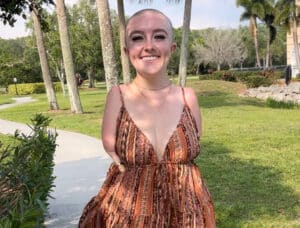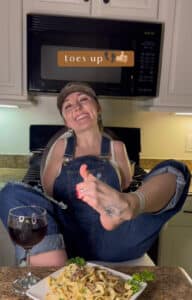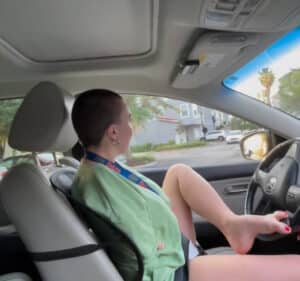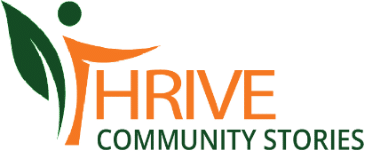By Jewel Connelly, Communications Specialist
 Positioning a chef knife between her toes, Emily Rowley expertly slices and dices with the skill and precision of someone experienced in the kitchen. In video after video, she prepares a variety of homemade vegetarian dishes from spicy ramen to ratatouille using only her feet, ending each with her signature toes up. And cooking is just one of the 22-year-old content creator’s many abilities. Moving at her own pace, Emily is continually challenging assumptions about what it means to live an independent life without arms.
Positioning a chef knife between her toes, Emily Rowley expertly slices and dices with the skill and precision of someone experienced in the kitchen. In video after video, she prepares a variety of homemade vegetarian dishes from spicy ramen to ratatouille using only her feet, ending each with her signature toes up. And cooking is just one of the 22-year-old content creator’s many abilities. Moving at her own pace, Emily is continually challenging assumptions about what it means to live an independent life without arms.
Upon meeting Emily for the first time, it’s easy to immediately be drawn to her big, joyful smile. Despite facing many physical challenges from birth, including bilateral upper limb amelia, microgastria/severe reflux, and scoliosis, Emily has always been incredibly resilient even as a child and determined to do what others assumed she could not. What she saw others do with their hands, she started learning how to do with her feet and not knowing any differently, it has become her adapted way of life. Embracing trial-and-error, Emily has approached the opportunity to try something new with an open mindset, something her parents and older sister helped to instill in her from the beginning. She remembers always being encouraged to try first and this mindset has served her tremendously as a young adult. “I think it would’ve been much more challenging to have confidence in myself if they had projected limitations onto me,” Emily said. “But because they were confident in me, it gave me the confidence that I needed to challenge myself.”
To her social media followers, Emily is known for her cheerful attitude and impressive ability to do all kinds of daily tasks with her feet, including putting on jewelry, makeup, checking the mail, writing, and even legally driving. It seems as if no task is outside the realm of possibility, and it all starts from observing others. “Before I try something new, I tackle it the way I’ve seen other people do it first,” she said. “After I go through the trial run, I think about what part was a little bit more difficult and what I can do to simplify the process and make it more accessible.
 Sometimes it’s actually easier for me to do it the way I’ve seen it done, and I learn something new.” Cooking is one of Emily’s favorite pastimes and for a long time she never challenged herself in that area. Time is a big factor in anything she does, but thanks to tools such as the chopper and mandolin, Emily is able to simultaneously increase efficiency while saving her energy. “It’s definitely a slow process, but the most enjoyable part about cooking is it’s so rewarding when I’m done,” she added. “When the meal is done, I’m like ‘Wow, I just did that.’”
Sometimes it’s actually easier for me to do it the way I’ve seen it done, and I learn something new.” Cooking is one of Emily’s favorite pastimes and for a long time she never challenged herself in that area. Time is a big factor in anything she does, but thanks to tools such as the chopper and mandolin, Emily is able to simultaneously increase efficiency while saving her energy. “It’s definitely a slow process, but the most enjoyable part about cooking is it’s so rewarding when I’m done,” she added. “When the meal is done, I’m like ‘Wow, I just did that.’”
Choosing to share aspects of her life on social media can be vulnerable, but for Emily the opportunity to spread awareness and educate others about living with a disability far outweighs any negativity she’s encountered. After graduating high school, she decided to put herself out there with a video and quickly realized how many people were curious to learn how she did different things. “It showed me there’s a big learning opportunity that not many people are going to fill,” Emily said. Sharing her own personal journey and connecting with others through her platforms has even allowed Emily to help parents of children experiencing similar challenges. “I’m so glad I was able to give parents some insight to start those initial steps of independence,” she said. “It’s really when you’re ready to challenge yourself and you have to be willing to fail and not let that stop you from trying again.”
 Perhaps the most important practice that has saved Emily from a lot of frustration is simply that she doesn’t compare her timeline or progress to anyone else’s. ‘It will come when it’s Emily’s time’ has always been her mantra. This is something she has discovered more as she’s gotten older, learning to have patience with herself and the fact that some things just take more time. To other members of the limb loss and limb difference community, she offers this advice: “Don’t let when people say ‘can’t’ be the end of you trying things; that would probably be the biggest challenge you’ll have to overcome,” she said. “If someone says you can’t, challenge them, try it. See if you can do it, because at the end of the day you’ll end up surprising yourself with how much you are fully capable of doing.”
Perhaps the most important practice that has saved Emily from a lot of frustration is simply that she doesn’t compare her timeline or progress to anyone else’s. ‘It will come when it’s Emily’s time’ has always been her mantra. This is something she has discovered more as she’s gotten older, learning to have patience with herself and the fact that some things just take more time. To other members of the limb loss and limb difference community, she offers this advice: “Don’t let when people say ‘can’t’ be the end of you trying things; that would probably be the biggest challenge you’ll have to overcome,” she said. “If someone says you can’t, challenge them, try it. See if you can do it, because at the end of the day you’ll end up surprising yourself with how much you are fully capable of doing.”
And Emily has done so much, including recently graduating with her bachelor’s degree in psychology from Southern New Hampshire University (SNHU) and accepting her first job. She will even be continuing at SNHU this May as she begins an online master’s program in forensic psychology with the goal of becoming a counselor. As one of many disability advocates, Emily realizes the power of her individual story and encourages others to leverage their own experiences during Limb Loss and Limb Difference Awareness Month and beyond. “The more people with disabilities who are willing to share their own personal stories, the greater and more diverse the education will be for others,” she emphasized. “That’s our biggest way to be an advocate for all, using the platforms that we have and being open to sharing our lived experiences.”
Follow Emily on TikTok, Instagram, and her YouTube Channel (@emrrowley).

